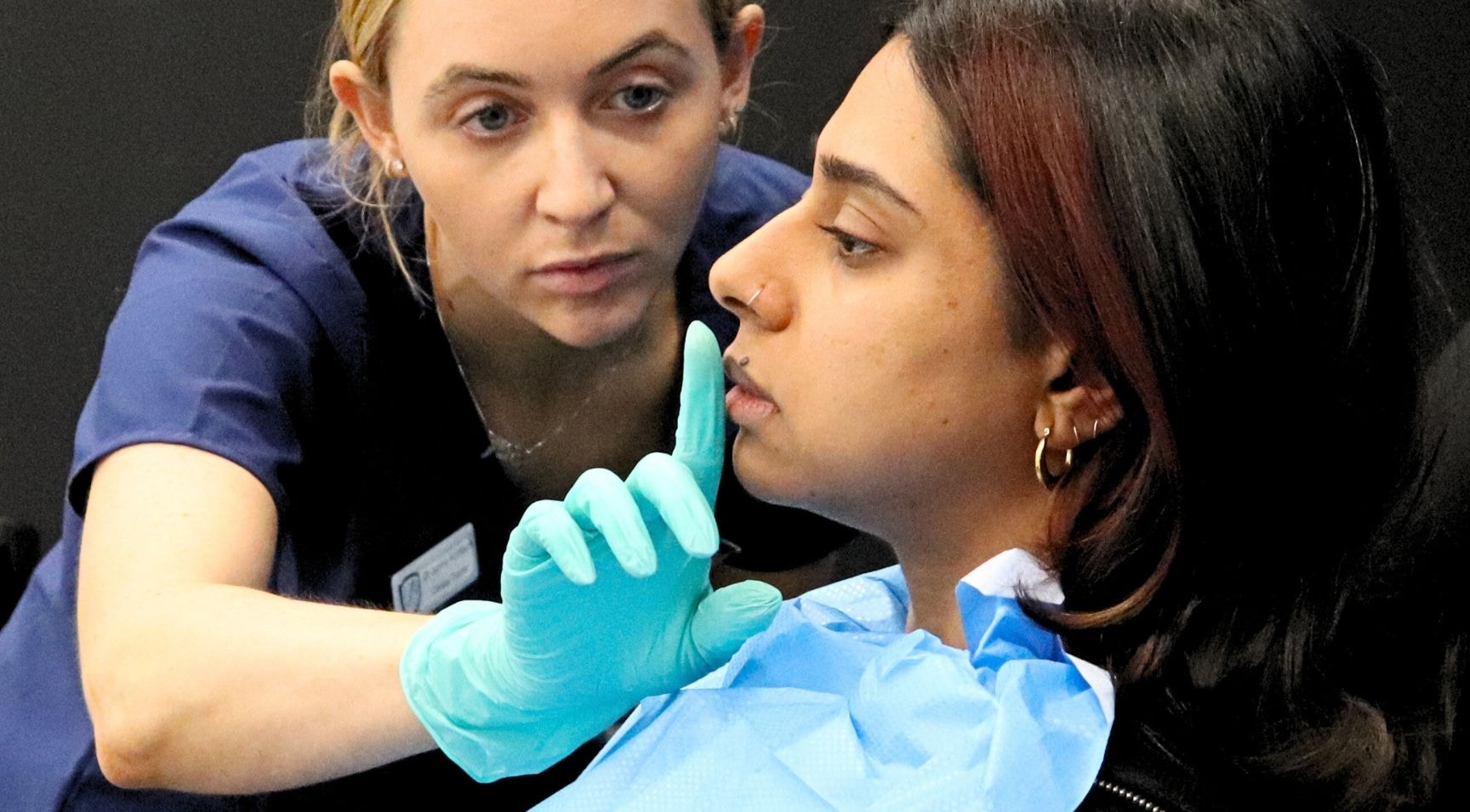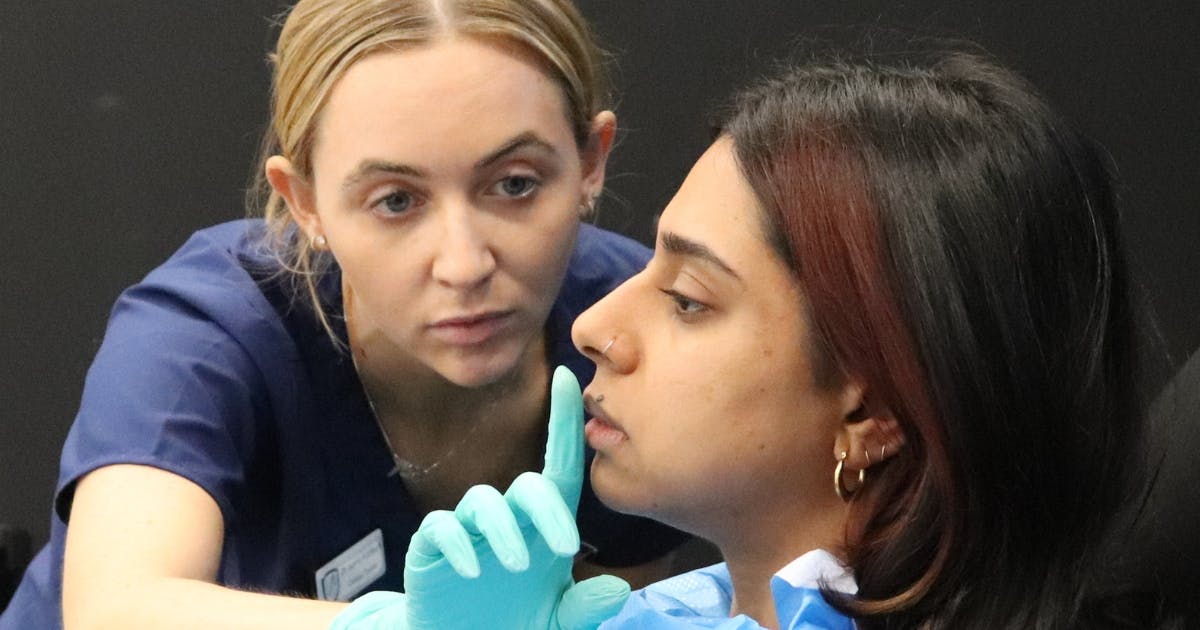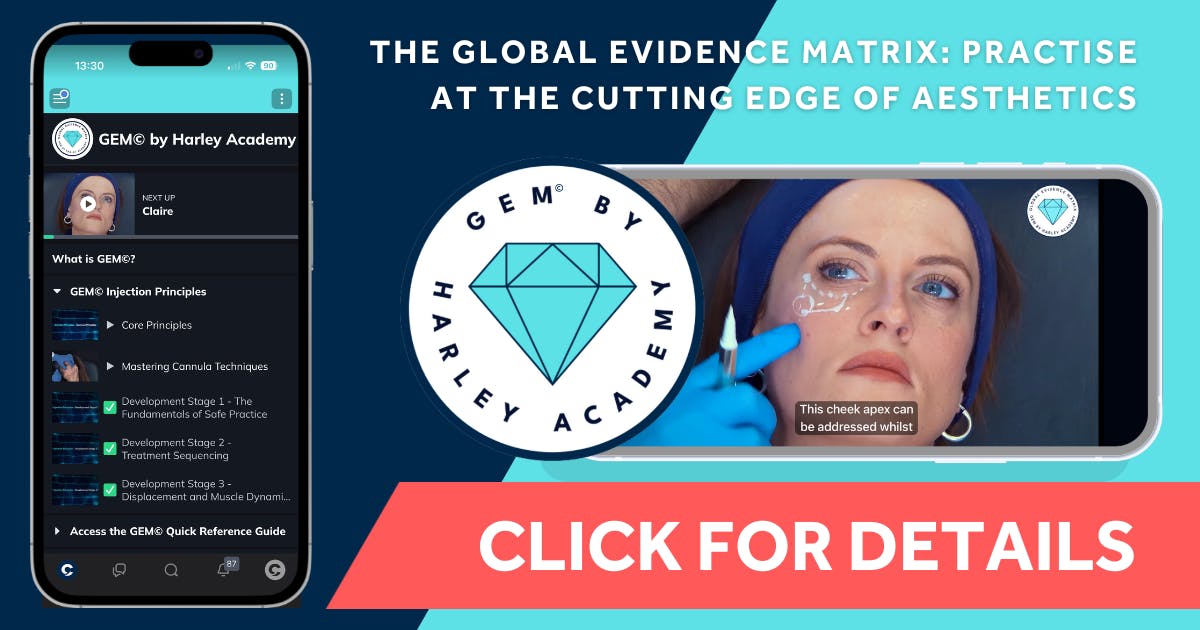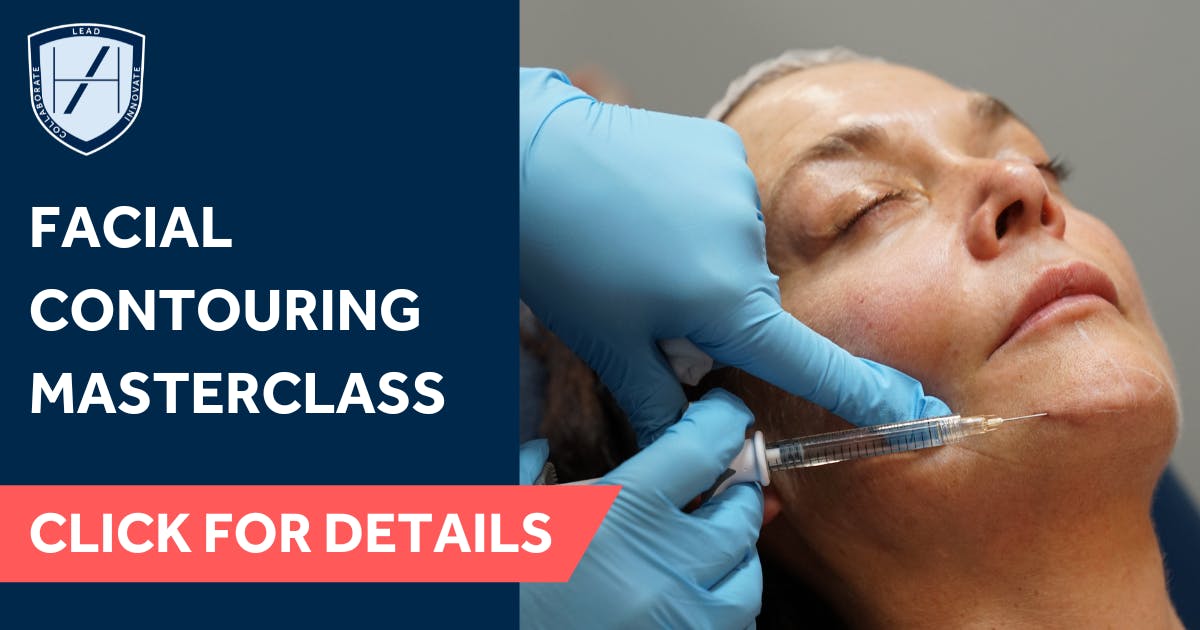Safer Filler Techniques for Profile Balancing

Identifying appropriate and safer filler techniques for profile balancing can transform your aesthetic patients’ facial proportions and features.
Profile balancing is rapidly becoming a popular request in aesthetic medicine - we've definitely seen an increase in demand at The Academy Clinic. In January 2025, Allergan Aesthetics released research stating 'more than 1 in 3 patients seek an improved chin, jawline or side profile'.
Profile balancing involves employing several elegant filler treatments customised to help bring harmony to a patient’s side profile. Essentially, it just means you're assessing them from the side to ensure their profile is proportionate and balanced.
Here, Clinical Trainer and aesthetics specialist, Paula O’Sullivan, RGN, shares her best practices for profile balancing.
You can also watch videos and get all the latest information on the most up-to-date techniques for treatments involved in profile balancing via the Global Evidence Matrix (GEM) app.

Why patients may request profile balancing
“Often, patients seeking a non-surgical rhinoplasty or lip augmentation may overlook the fact that their side profile reveals a small chin. A well-proportioned nose or enhanced lips can accentuate a small chin, disrupting the overall balance of the lower face”, Paula clarifies.
“Profile balancing addresses this by adjusting a retracted chin to the appropriate ratio relative to the nose and lips, harmonising the side profile."
What treatments are used in profile balancing?
Profile balancing typically includes any or all of the following primary treatments:
- Chin filler
- Nose filler (advanced treatment)
- Lip filler
These can also be considered supplementary treatments for profile balancing:
- Cheek filler (apex)
- Jawline contouring
- Forehead filler (advanced treatment).
'Profile balancing' simply means assessing your patient from the side, to ensure they have a harmonious profile. As such, any treatment that has an effect on this can and should be considered to deliver an appropriate, holistic result based on your patient's anatomy and concerns.
Advanced treatments, such as non-surgical rhinoplasty and forehead filler are best left to experienced practitioners. These are some of the most high-risk aesthetic treatments and are not something novices should attempt.
Assessing a patient for these treatments
In her own aesthetics clinic, Paula finds, “There is an indication for each assessment tool and the findings will guide my treatment planning."
During the consultation, she recommends “assessing the patient's full face by studying the facial thirds, facial fifths, and Ricketts’ line.” For example, “you should consider the patient’s bizygomatic width and their bigonial width.”
She suggests that aesthetics practitioners approach it with “the understanding that female patients tend to have a narrower bigonial width than men. Typically, men will have an equal distance and, therefore, a more square-shaped face.”
Similarly, when administering chin filler, a square chin is seen to be more masculine, whereas a pointed chin is more traditionally feminine. We have written about understanding masculinisation versus feminisation in our article on jawline contouring.
When considering the Frankfort plane, Paula counsels, “Your patient’s face must be in a neutral resting position using the Frankfort plane. This means the top of the tragus should be in line with the anterior projection of the orbital rim. The nasion should be in line with the most anterior projection of the chin - the pogonion. In this instance, chin filler would be a good option to consider.
“Dermal fillers can be strategically applied to the chin to achieve a more defined and contoured appearance. Many patients choose to combine this treatment with jawline filler. These procedures complement each other, resulting in a more structured and refined facial appearance”, she notes.
Using these assessment tools “ensures your baseline assessment is the same for each patient. It often highlights areas that require dermal filler enhancement to achieve their goals. At this point you can continue with the consultation with your patients on which aesthetics treatment would achieve the desired best results,” Paula clarifies.

Injecting filler using a cannula vs a needle
“When choosing the appropriate tool for administering dermal filler, I think about the underlying anatomy. In particular, the facial vasculature in the area I’m injecting and depositing filler.”
Paula states that “with anatomy, product choice and volume in mind, my tool choice mostly sways me towards cannula for safer administration. However, it varies for each patient depending on what layer I’m injecting and what result I’m trying to achieve."
She confirms she would “use a needle with caution and inject small volumes using low pressure and extrusion force. When using a cannula, I'd opt for a 22 gauge for the mid-face and lower face.
“I typically use a needle when a bolus is required, which is often the case for structural support. Whilst injecting, whether using a cannula or needle, I’m constantly assessing for skin perfusion and any concerning signs of vascular compromise."
When it comes to treating the lips, a cannula can be preferable. However, for more delicate work - such as treating the vermillion border, a needle offers precision. You can find plenty of advice on lip filler techniques in our articles archive.
Did you know you can search for topics on our Aesthetic Medicine Articles homepage? Just pop your topic into the search bar or choose one of the section headings to browse articles on that subject.
Whilst this advice was correct at the time of publication, check your GEM app for the latest information. This is always kept current and is based on the most up-to-date scientific data for an evidence-led approach to aesthetic medicine.
The best filler techniques for safer profile balancing
Paula talks us through how she approaches profile balancing and the filler injection techniques she applies.
“The filler used for profile balancing will likely be a firm product and possibly in large volumes," Paula explains.
You should always choose your product based on the area you're treating. For example, whilst a firm product will suit the jawline and chin, the mid-face and lips will require a softer filler. The optimal product type is always provided in the GEM app quick-reference matrix, alongside the injection technique, cannula vs needle, injection depth, and more.
“Commonly when injecting the lower face, such as chin filler, to achieve an improved profile balance, I add filler down onto the periosteum in layer five using a needle and deliver a small supra periosteal bolus. This creates support and structure before I target the superficial fat using a cannula.
"Here, I deposit filler in retrograde linear threads to offer a more contoured and defined result,” she continues.
“Once I’ve added the desired amount of filler - and volume is patient-dependent - I gently massage the area whilst checking the capillary refill time.”
How to mark up a patient for profile balancing filler treatments
“When aiming to achieve an improved profile balance, landmarks for injections are essential,” Paula stresses. “With every landmark, I’m considering the patient's unique facial anatomy and what I would like to achieve for them. This is something we will have established and discussed at length in their initial consultation.
“When targeting the chin, for example, I ask myself if I need to lengthen or anteriorly project the chin in cases of retrognathia. Depending on the treatment required I would landmark to guide my treatment according to the patient’s anatomy”, she cites.
If you're treating the mid-face to help with profile balancing, check out our article on marking up for cheek filler.
Our GEM app - which Harley Academy Level 7 trainees receive a free 12-month subscription to - contains marking up videos for all treatment areas. These are included in the GEM Library of 4K HD videos, at the start of each treatment. You can find out more about the Global Evidence Matrix in our article, GEM's Comprehensive Aesthetics Training Support: From Novice to Expert.
You can watch a full-length video case study which includes some of the filler treatments mentioned here, including forehead filler and non-surgical rhinoplasty (nose filler) on YouTube. The Claire: Full Face Filler Case Study video is now available on the Harley Academy YouTube channel and is free to watch!
Profile harmonising pitfalls injectors should be wary of
There are a few pitfalls new medical aesthetic practitioners should be cautious of when approaching profile balancing.
Paula advises, “Be mindful when injecting the lower face and avoid adding filler to an already heavy area, such as the jowls.
“The rheology of the filler you use in this area will be of a high G prime. This can worsen the areas of existing heaviness.”
She adds, “Depending on the significance of the problem, don’t underestimate or over-promise results to your patient and ensure their expectations are met.
“Usually, multiple mls of dermal filler are required to address profile imbalance. It’s important to communicate this to your patient rather than promising a result with 1 ml. Failing to do so can lead to patient dissatisfaction.”
Enhance your skills with specialist-led medical aesthetics training
At Harley Academy, we specialise in providing the highest quality training in aesthetic medicine. Our Level Diploma in Cosmetic Injectables is available to doctors, dentists, nurses and clinical pharmacists.
A highly respected qualification, our Level 7 Diploma is both Ofqual-regulated and JCCP-approved. It’s the perfect start to your medical aesthetics career and will set you up with key anatomical knowledge, injecting skills and techniques for botox and fillers.
If you're looking for a more targeted approach, our Facial Contouring Masterclass may best suit your needs.
In this day-long Injectables Masterclass, you’ll hone in on your facial contouring filler techniques for the mid-face and lower face. This will allow you to level up specific treatment skills through specialist-led hands-on aesthetics training. You’ll treat your own patient under the supportive supervision of our friendly and experienced clinical trainers.
Through this you’ll learn to confidently assess a patient’s face and combine filler treatments to add harmony and balance to the face. You'll leave feeling inspired, ready to introduce your new approaches to your patients and wow them with proportionate, natural-looking results.
The data on the demand for profile balancing treatments is there - both anecdotally and through Allergan's latest survey. Are you ready to grasp those opportunities?
Book a call with one of our Course Advisors to find out more about what aesthetics courses are available to you. They’ll help you find the right pathway to achieve your career goals in the most ethical, evidence-led way.
All information correct at the time of publication
Download our full prospectus
Browse all our injectables, dermal fillers and cosmetic dermatology courses in one document
By submitting this form, you agree to receive marketing about our products, events, promotions and exclusive content. Consent is not a condition of purchase, and no purchase is necessary. Message frequency varies. View our Privacy Policy and Terms & Conditions
Attend our FREE open evening
If you're not sure which course is right for you, let us help
Join us online or in-person at our free open evening to learn more
Our Partners













STAY INFORMED
Sign up to receive industry news, careers advice, special offers and information on Harley Academy courses and services



